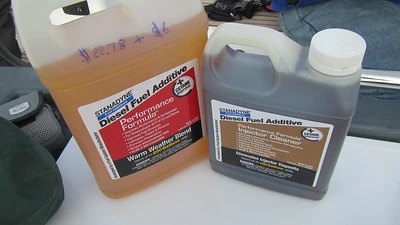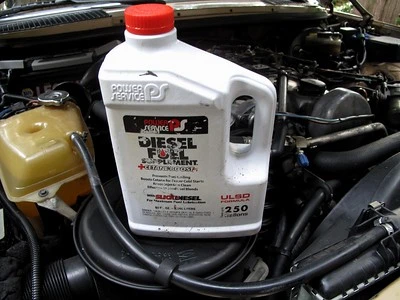
Yes, diesel additives generally work in all types of diesel engines, including cars, trucks, boats, and heavy machinery. They can help improve fuel efficiency, reduce emissions, and keep the engine clean. However, it’s important to choose the right additive for your specific engine and fuel system. Always follow the manufacturer’s recommendations for the best results.
Diesel additives are chemicals added to diesel fuel to enhance its performance or protect the engine. They can help improve fuel quality, increase engine efficiency, reduce emissions, and prevent issues like fuel gelling in cold weather or the buildup of deposits in the fuel system.
Most diesel additives are designed to work in all types of diesel engines, whether in cars, trucks, boats, or heavy machinery. They are formulated to be compatible with the fuel systems and engine components found in various diesel-powered vehicles and equipment.
However, not all additives are the same. Some are specifically formulated to address certain issues, such as cold flow improvers for winter conditions, cetane boosters for improved combustion, or detergents for cleaning injectors. It’s essential to select the right additive based on the specific needs of your engine and the conditions it operates.
For best results, always follow the recommendations provided by your vehicle or equipment manufacturer and the instructions on the additive’s packaging. This ensures that the additive will work effectively and not cause any harm to the engine or fuel system.
Read Also: Are Diesel Additives the Same as Fuel Stabilizers?
What Are Diesel Additives?

Definition and Purpose Diesel additives are special chemicals that you mix with diesel fuel to improve its performance or protect your engine. They help by cleaning engine parts, preventing fuel from freezing in cold weather, and making the engine run smoother. Think of them as vitamins for your diesel engine that keep it healthy and running efficiently.
Common Types of Diesel Additives
- Cetane Boosters: These additives increase the cetane number of diesel fuel. The cetane number is a measure of how quickly and efficiently the fuel ignites in the engine. Higher cetane numbers generally mean better engine performance and reduced emissions. For example, a cetane booster might raise the cetane number by 2-10 points.
- Anti-Gel Agents: These are crucial in cold climates. Diesel fuel can start to gel or thicken when temperatures drop below 32°F (0°C). Anti-gel agents prevent this by lowering the fuel’s freezing point, ensuring it flows smoothly to the engine even in freezing temperatures.
- Detergents: Detergent additives clean the fuel system, including the injectors and fuel lines. They help remove deposits that can build up over time, improving fuel efficiency and preventing engine knocking. For instance, detergents can reduce injector deposits by up to 90%, leading to smoother engine operation.
These additives come in various formulations, and it’s essential to use the right type for your specific diesel engine and operating conditions.
Read Also: Correct Dosage of Diesel Additive: Finding the Right Amount
Effectiveness Across Different Diesel Engines
1. Passenger Vehicles: Common Additives Used, Benefits, and Considerations
- Common Additives: Cetane boosters, detergents, and anti-gel agents.
- Benefits: Cetane boosters improve combustion efficiency, leading to smoother engine operation and reduced emissions. Detergents help keep injectors clean, enhancing fuel economy and performance. Anti-gel agents are essential in cold climates to prevent fuel from thickening.
- Considerations: It’s important to use additives compatible with the vehicle’s fuel system and to follow manufacturer guidelines. Overuse of additives can lead to engine issues or void warranties.
2. Commercial Trucks and Buses: Importance of Fuel Efficiency and Emissions Control
- Common Additives: Detergents, cetane boosters, and fuel stabilizers.
- Benefits: Detergents help maintain injector cleanliness, crucial for fuel efficiency over long distances. Cetane boosters improve fuel combustion, reducing exhaust emissions and meeting regulatory standards. Fuel stabilizers are used to maintain fuel quality during storage, especially in large fleets.
- Considerations: Trucks and buses often operate under strict emissions regulations, so using the right additives can help meet legal requirements and reduce environmental impact. Cost-effectiveness is also a key factor, as these vehicles consume large amounts of fuel.
3. Marine Engines: Special Considerations for Marine Environments
- Common Additives: Fuel stabilizers, biocides, and anti-corrosion additives.
- Benefits: Fuel stabilizers prevent fuel degradation during long periods of storage, which is common in marine environments. Biocides protect against microbial growth that can clog fuel systems. Anti-corrosion additives protect metal components from saltwater exposure.
- Considerations: Marine engines face unique challenges, such as saltwater corrosion and fuel contamination. It’s essential to use additives that address these issues to ensure engine reliability and longevity.
4. Agricultural and Construction Machinery: Dealing with Harsh Conditions and Heavy-Duty Use
- Common Additives: Anti-gel agents, detergents, and lubricity enhancers.
- Benefits: Anti-gel agents are crucial in preventing fuel from gelling in cold weather, ensuring machinery can start and operate in winter conditions. Detergents keep injectors clean, which is important for engines operating in dusty or dirty environments. Lubricity enhancers help reduce wear and tear on engine components under heavy loads.
- Considerations: These machines often work in challenging conditions, including extreme temperatures and rough terrains. The right additives can help protect the engine and extend its service life.
5. Generators and Stationary Engines: Maintaining Reliability and Performance
- Common Additives: Biocides, fuel stabilizers, and cetane boosters.
- Benefits: Biocides prevent microbial growth that can clog filters and damage the engine. Fuel stabilizers maintain fuel quality during long periods of storage, ensuring the generator is ready when needed. Cetane boosters improve combustion efficiency, which is particularly important for stationary engines that may run continuously for long periods.
- Considerations: Reliability is critical for generators and other stationary engines, especially those used for backup power. Regular use of the appropriate additives ensures these engines start and run smoothly when required.
Each type of diesel engine has specific needs and challenges, and the use of the right additives can significantly enhance performance, reliability, and longevity. It’s important to choose additives that match the engine’s requirements and operating conditions.
Read Also: Diesel 911 Bad for Engine? (What Experts Have to Say)
Factors Influencing Additive Effectiveness
- Fuel Quality and Composition: The quality of diesel fuel can vary based on where you buy it. Additives may work differently with fuel that has more or fewer impurities. For example, if your diesel has a sulfur content of 15 parts per million (ppm), it might need different additives than fuel with 500 ppm.
- Engine Design and Age: Newer engines with advanced technology, like turbochargers or common rail injection systems, may respond better to certain additives compared to older engines. An engine that’s 10 years old might have different needs than a brand-new one, especially in terms of keeping components clean or improving fuel efficiency.
- Operating Conditions: The environment where the engine runs plays a big role. For example, in cold climates where temperatures can drop below 32°F (0°C), anti-gel additives are crucial to prevent fuel from freezing. Similarly, engines running under heavy loads, like those in trucks carrying 20,000 pounds, might benefit from additives that enhance lubricity.
- Manufacturer Recommendations and Warranty Considerations: It’s important to follow the advice of your vehicle or equipment manufacturer. Using additives not recommended by the manufacturer can void your warranty, which covers repairs for a certain number of miles or years, like 100,000 miles or 5 years. Always check the owner’s manual or consult with a professional to ensure you’re using the right products for your engine.
Choosing the Right Diesel Additive
- Importance of Selecting the Appropriate Additive for Specific Needs: Not all diesel additives are the same, and it’s important to pick one that matches your engine’s needs. For instance, if you’re driving in a cold area where temperatures can hit 20°F (-6°C), you’ll want an anti-gel additive to keep your fuel from freezing. On the other hand, if you’re trying to improve fuel efficiency, a cetane booster might be the right choice to raise the cetane number by a few points.
- How to Read Labels and Understand Product Specifications: When choosing an additive, look at the label for key information like the recommended dosage, which is usually stated in milliliters per gallon (ml/gal). For example, a product might suggest using 1 ounce (about 30 ml) per 10 gallons of fuel. Also, check for specific benefits mentioned, such as “improves fuel economy by up to 5%” or “reduces injector deposits by 90%.”
- Consulting Manufacturer Guidelines: Always refer to your vehicle’s owner’s manual or consult with the manufacturer to ensure the additive is safe for your engine. The manual might specify the types of additives that are compatible with your engine and those that could void your warranty, which might cover repairs for up to 100,000 miles or 5 years. Following these guidelines helps protect your engine and ensures you’re getting the best performance.
Potential Risks and Considerations
- Overuse or Misuse of Additives: Using too much of an additive or the wrong type can harm your engine. For example, adding double the recommended amount of a cetane booster can lead to engine knocking or even damage. It’s important to follow the dosage instructions on the label, typically given in milliliters per gallon, to avoid these issues.
- Compatibility Issues with Certain Engines or Fuel Systems: Not all additives are suitable for every engine. For instance, some additives designed for older diesel engines with mechanical fuel injection systems may not work well with newer engines that use high-pressure common rail systems. Using an incompatible additive can lead to problems like clogged injectors or reduced fuel efficiency.
- Impact on Engine Warranties: Using additives that aren’t recommended by the vehicle manufacturer can void your engine warranty. For example, if your warranty covers engine repairs up to 100,000 miles or 5 years, using an unapproved additive could make you responsible for repair costs if something goes wrong. Always check your owner’s manual or consult with the manufacturer before using any additives to ensure they won’t affect your warranty coverage.
To Make A Conclusion
In summary, diesel additives can be highly effective in enhancing the performance and longevity of diesel engines across a variety of applications, including passenger vehicles, commercial trucks, marine engines, agricultural machinery, and stationary generators. They help improve fuel quality, boost engine efficiency, reduce emissions, and protect against fuel-related issues like gelling and microbial growth.
However, the effectiveness of diesel additives depends on choosing the right product for your specific engine type and operating conditions. It’s crucial to consider factors such as fuel quality, engine design, and manufacturer recommendations. Misuse or overuse of additives, as well as compatibility issues, can lead to engine problems or void warranties.
Ultimately, when used correctly and in the appropriate situations, diesel additives are valuable tools for maintaining and optimizing diesel engine performance. Always follow guidelines and consult with professionals to ensure the best results for your engine’s specific needs.
